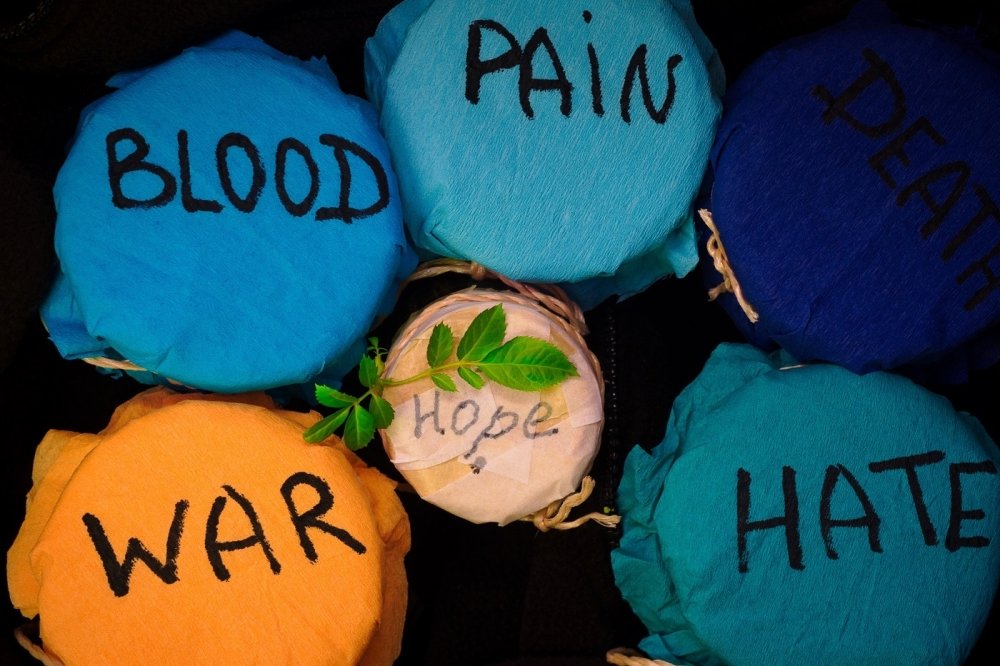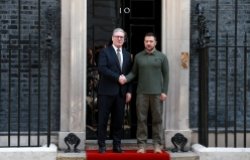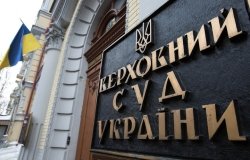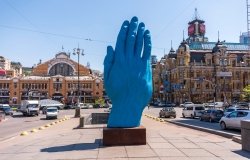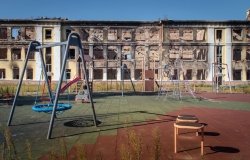
A blog of the Kennan Institute
Acting Out Wartime Emotions
“When you hear the sound of a shell flying at your house, at first you feel fear, then hatred. Hatred for whoever did it. For all of Russia, for all inhabitants without exception.” This line, by the first-person narrator in Olena Astaseva’s play “A Dictionary of Emotions in a Time of War” reveals more about the future of Ukrainian-Russian relations than all the well-meaning calls for peace in formal and informal media outlets.
Theater’s artificiality at times opens opportunities for truth-telling uninhibited by ordinary life. A collection of 20 plays written by Ukrainian playwrights in response to Russia's 2022 invasion of their country provides a range of deeply personal—even confessional—stories and observations about the war. Compiled, edited, and introduced by John Freedman, A Dictionary of Emotions in a Time of War: 20 Short Works by Ukrainian Playwrights should be compulsory reading for anyone trying to work through what has happened, and will happen, in Ukraine.
The heroine of Iryna Harets’s play “Planting an Apple Tree” tries to carry on something of a normal life. Living in the countryside, her character admits that “I even feel guilty that my sister is being bombed in Kharkiv, and my family is being bombed in Kyiv. I try not to think about the many places where people are on the verge of a humanitarian catastrophe, without water, food, medicine, and where children die of dehydration.” She does not forget their suffering; she responds differently to it. She plants an apple tree. She does so because “one needs love and humanity in these days of rage and hatred.”
Astaseva and Harets are two of 18 playwrights from throughout Ukraine who have contributed to the volume. They include Pavlo Arie, Ihor Bilyts, Natalia Blok, Andriy Bondarenko, Vitaliy Chenskiy, Julia Gonchar, Oksana Grytsenko, Olena Hapieieva, Iryna Harets, Maksym Kurochkin, Tetiana Kytsenko, Kena Lagushonkova, Yevhen Markovskiy, Olha Maciupa, Kateryna Penkova, Oksana Savcjenko, Liudmyla Tymoshenko, and Natalka Vorozhbyt.
The plays contained in this essential volume speak to the rawest and most revealing emotions of war. Most of the work in A Dictionary of Emotions in a Time of War emerged from the Worldwide Ukrainian Play Readings Project and Kyiv’s Theater of Playwrights during the opening days of the war (17 were penned in March 2022, two in late June, and one was completed in November). These works have been read and performed around the world. Translated and published together, the new book offers opportunities to reach new audiences and readers. Furthermore, they reflect and are contributing to an exciting emerging theater scene in Kyiv.
Internationally recognized Ukrainian dramatist Maksym Kurochkin had returned to Kyiv in recent years and was working to open the new Theater of Playwrights dedicated to Ukrainian works in March 2022. The war altered his plans only slightly. Many of the works contained in this book were read at a triumphant marathon session in the theater’s unfinished basement on June 24.
Theater critic John Freedman—working with Philip Arnoult at the Center for International Theater Development in Baltimore—made the Worldwide Ukrainian Play Readings into CITD’s signature project, providing $1,000 commissions to 23 playwrights. The project has supported new works to be read and performed around the world.
To date, the project has entered 129 plays by more than 45 Ukrainian writers into an ongoing database. The project has sponsored more than 295 readings in 29 countries and in 19 languages, reaching over 12,000 audience members [this blog has reported on four of these performances in 2022, in posts dated March 23, May 16, August 5, and December 9]. These events have raised more than $750,000 for direct aid, medical supplies, and food for Ukrainian hospitals, shelters, food distribution centers, and elder care facilities.
The plays respond to the experience of Ukrainians on the ground, trying to answer unanswerable questions, like, why are Ukrainians fighting so ferociously? Perhaps Hapieieva tells us what we need to know in “The Bowels of the Earth”:
I remember the crumbly black earth in my grandmother’s garden. It had such an intoxicating smell. Your hands would be dry, black, and cracked. Now we all sit in the bowels of the earth. They want to take someone else’s land. The earth protects. It hides. It covers. Ukrainians are defending this earth with their weapons. The occupiers’ boots tread on this earth. Such young men from the Russian hinterlands. Stupid and aggressively naïve. They stomp on the graves of my forebearers. They burn them with fire and level them with the earth. They themselves fall and smolder on the earth. The earth burns their feet, breaks their hearts.”
Such primal sentiments are too crude for refereed social science journals and government policy briefs. These words are made for the stage, where profound truths can be expressed more openly.
The opinions expressed in this article are those solely of the author and do not reflect the views of the Kennan Institute.
See our newest content first.
Subscribe to receive the latest analysis from the Focus Ukraine blog.
About the Author

Blair A. Ruble
Former Wilson Center Vice President for Programs (2014-2017); Director of the Comparative Urban Studies Program/Urban Sustainability Laboratory (1992-2017); Director of the Kennan Institute for Advanced Russian Studies (1989-2012) and Director of the Program on Global Sustainability and Resilience (2012-2014)

Kennan Institute
The Kennan Institute is the premier US center for advanced research on Eurasia and the oldest and largest regional program at the Woodrow Wilson International Center for Scholars. The Kennan Institute is committed to improving American understanding of Russia, Ukraine, Central Asia, the South Caucasus, and the surrounding region though research and exchange. Read more


